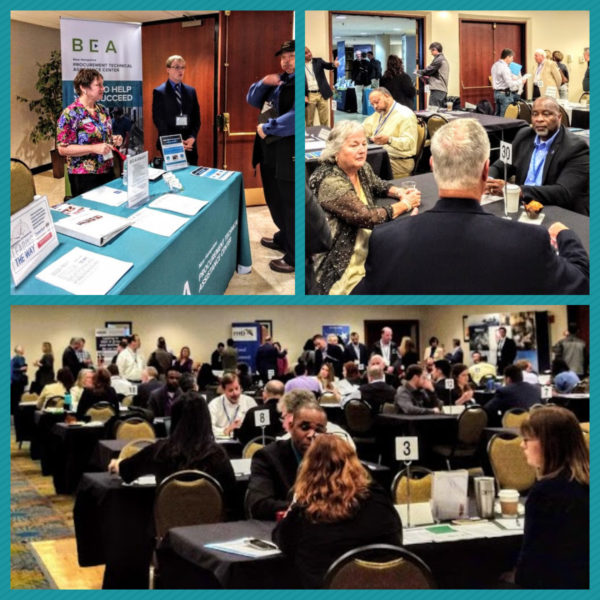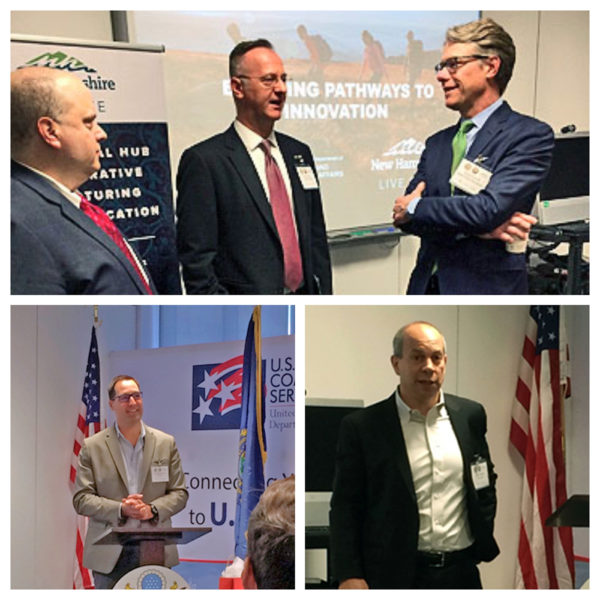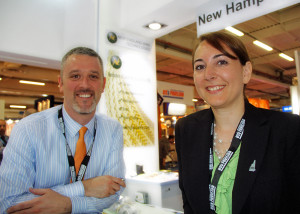
Nearly 100 people from around the country converged on Portsmouth at the end of April for the Bureau of Industry and Security’s U.S. Export Controls Training Seminars. Business and Economic Affairs Commissioner Taylor Caswell and US Rep. Chris Pappas spoke on the importance of exporting to the New Hampshire economy. 
Industry leaders converged in Hanover last week to the annual Governor’s Conference on Tourism. The state’s second largest industry brings 39 million visitors here from around the world, who generated more than $5.5 billion in spending last year. 
The annual New England Matchmaker in Portland, Maine drew scores of New Hampshire small business representatives, taking the opportunity for one-on-one meetings with prime contractors on the goods and services they need to fulfill government contracts. 
A team from New Hampshire traveled to Toronto for a presentation to Canadian businesses about the state’s vibrant life sciences sector, which is 300+ companies strong.
Posts Tagged ‘exporting in NH’
Throughout April, Business was on the Agenda in New Hampshire
Thursday, May 2nd, 20195 Questions with Karen Wyman, Granite State District Export Council
Friday, May 29th, 2015One of the most difficult challenges an expanding business can face is how to bring its products and services to other countries. Language barriers are just the beginning – regulations (domestic and international) must be minded, marketing strategies must be adjusted, contacts must be made, and oftentimes additional funding is required to get a company’s exporting activity off the ground.
To find out more about the resources available to New Hampshire businesses in navigating this landscape, we interviewed Karen Wyman, trade compliance manager at Elbit Systems of America in Merrimack. Ms. Wyman is also the chairman of the Granite State District Export Council, a private, non-profit organization whose members are appointed to four-year terms by the US Secretary of Commerce. DECs connect experienced international business people for mentoring and advising other businesses on their entry or expansion into international markets.
1. The official mission of the Granite State DEC is “to encourage and support exports that strengthen local business, stimulate economic growth and create jobs.” What does that look like on a day-to-day basis?
On a daily basis, the DEC members are called upon to assist other New Hampshire exporters with specific questions or issues they face. DEC members are vetted and approved by the US Department of Commerce to ensure they meet the requirements of DEC membership, such as being able to be of benefit to the local exporting community in a productive and ethical way.
Other activities include the management and running of various grant programs that we have co-funded with other exporting agencies and groups within New Hampshire.
We also participate in the many international trade events hosted around the state and coordinate provision of services with our many partners, in New Hampshire and around the world, especially the New Hampshire Export Assistance Center, New Hampshire Office of International Commerce, New Hampshire Aerospace and Defense Export Consortium and Small Business Development Centers.
We often act as a multiplier for our partners, promoting their events, supporting their activities financially and administratively, etc.
2. Can you share a couple of examples of how the DEC assisted individual businesses recently?
– One DEC member has assisted a New Hampshire exporter needing information on how to export to India and the “ins” and “outs” of having a local representative there;
– Another DEC member has assisted several New Hampshire exporters with specific and general questions regarding export compliance (the regulations overseeing exports of items of national security sensitivity);
– One DEC member recently assisted a New Hampshire exporter with an issue related to the use of a carnet in Italy. A carnet, also known as a merchandise passport, can simplify customs procedures for temporary imports into a country. – Ed.
3. What, in your opinion, are the biggest challenges businesses face today when trying to export their products and services?
– Lack of knowledge of how to penetrate a specific foreign market. Each country has different sets of regulations, norms, and cultural expectations, all of which impact how a product or service is sold in that country. To varying degrees an exporter needs to modify its export strategy for each target country. It’s hard to know all the information you need to be successful in that market. Through the DEC and its many partners, we can help an exporter find those elements needed for its success.
– Complex export regulations. New Hampshire is strong in high technology products and services, whether it’s for the medical, IT, aerospace or defense sectors. Due to the high level of technology involved, the US has regulations to ensure that those technologies do not fall into enemy hands. The various sets of regulations are complex, confusing, and in many cases, overreaching in their control. The DEC, along with our partners and the Congressional Delegation, have been advocating for the alignment and revision of these regulations to meet both the needs of national security and the exporter.
– The need for funding export expansions. Many companies need assistance with capital needed to expand due to an international contract, project, etc., but banks are often skittish about helping. A number of sources for help exist for New Hampshire exporters:
* Export Import Bank – This bank has been a vital resource for a number of exporters as they need capital to fund their international endeavors. It’s a US government agency, which receives no funding from taxes, with the sole purpose of helping US exporters!
* NH Export Expansion Fund – a micro grant system funded in part by the DEC to get a small international project off the ground.
* SBA financial programs – SBA has several programs to assist small exporters.
4. How did you, personally, come to the DEC, and what inspires you to do this work on behalf of NH’s exporters?
I used to work at the state’s International Trade Resource Center when the DEC was reinitiated. I was asked to be a member so I could provide my knowledge in a capacity that was needed by our exporters.
I love helping companies expand their markets internationally. I’ve traveled around the world and have seen and experienced the complexities that exist. It’s very satisfying to help an exporter succeed in a market.
The help I provide ultimately helps the overall state economy. New Hampshire has a very strong mix of beautiful nature, great education and advanced business. I live here, I want to keep it thriving for all of us to enjoy.
5. What events does the DEC have coming up for businesses interested in learning about or ramping up their exporting activities?
Upcoming events are:
– NHADEC annual conference, 4- 8 pm, Wednesday, June 10;
– Healthcare Executive Service to India, Monday, July 27 -Saturday, Aug. 01;
– State of New Hampshire Trade Mission to Colombia, Oct. 19-21.
More information for these events and a listing of all of our events, and those we promote, can be found on our website.
5 Questions with Tina Kasim: Opening the Door to Exporting NH Goods
Friday, March 27th, 2015On first blush, the idea of exporting products and services to another country can seem daunting, overwhelming, or confusing to businesses that have never done it before. However, New Hampshire has a prolific network of resources to support new and currently exporting businesses with financing, insurance, export controls, market research, logistics, and other specialized aspects of the exporting business.
To get an introduction to the world of exporting opportunities, we interviewed Tina Kasim, international program manager for the Office of International Commerce. Tina has more than 10 years of experience in international economic development programs. She started her career with the New Hampshire Division of Travel and Tourism Development, before moving to Jordan and later to Washington, DC, where she worked on internationally funded economic development programs in the Middle East-North Africa Region. She then brought this diverse range of expertise back to New Hampshire and the OIC, a part of the Division of Economic Development.

Tina Kasim, NH Office of International Commerce, and Justin Oslowski, US Department of Commerce, at the Paris International Air Show, where five NH businesses exhibited in 2013.
With the assistance of the OIC and the support of STEP Grants, many companies have been able to participate in international business events over the last several years. Can you share some brief success stories from companies that attended those events?
Over the last few years, the State Trade Export Promotion (STEP) grant has enabled our program to offer several opportunities to New Hampshire exporters, including access to and attendance at key international trade activities, in order to build a presence in a variety of markets.
Whether funding was put toward a State of New Hampshire pavilion made up of several New Hampshire exporters at a trade show or funding provided via a matching grant dedicated a company’s sales mission to Europe, OIC’s approach to put the STEP grant to use effectively centered on the needs of New Hampshire businesses.
Their successes range from signing distributors and agents in new markets, which allows them to increase sales, to connecting with numerous existing and potential clients in a single arena that allows them to nurture the relationship they have been cultivating for many years. After all, a lot, if not all, business is based on relationships.
Additional successes include the increased make-up of international sales in the revenues of participating businesses, which have resulted in the creation of new jobs in the state.
OIC is one piece of a larger infrastructure that supports businesses in their exporting efforts. Can you share a bit about the other public and private sector organizations all working together to serve New Hampshire’s exporting businesses?
The OIC is one link to a global network supported by the US Department of Commerce/US Commercial Service. Wherever in the world there is a US embassy or consulate, there is a team on hand that works to advocate and promote US businesses in that market.
OIC is also closely connected to SBDC, SBA, Export-Import Bank, and SCORE, all of which help tackle issues related to developing an international marketing plan and finding the financing for your export plans.
OIC also has a key partnership with the Granite State District Export Council (an affiliate of the US Department of Commerce, made up of mostly private sector business people), which offers peer-to- peer counseling to all things related to international business.
The great thing though about all these resources is the fact that there is no wrong door to knock on when you want to get into this line of business. Everything you may need is only a phone call or an email away.
Why, in your opinion, is New Hampshire such a great place for exporters to start or expand their businesses?
New Hampshire companies are run by savvy business owners and teams. They’re aggressive in identifying new markets and opportunities and they have great products and services to export that are innovative and really customized based on client requests. There is also this tight-knit network of resources available to businesses for the vast array of questions or obstacles that might pop up for business owners when developing international markets.
Where do you see the biggest opportunities for growth for New Hampshire businesses?
There is not a one-size-fits-all answer to this question; it really does depend on the sector/industry on which a business focuses and which markets are best suited to the product or service.
Trends are pointing to areas in the Middle East for the medical sector, where there is a high demand for solutions, monitoring equipment and delivery of medications related to diabetes. The region is also experiencing the construction of new and big hospitals in various parts of the countries and has a need to monitor patients remotely.
The aviation industry as a whole is and will continue to see the need for components for airplanes, as airliners replace aging fleets with more fuel efficient and lightweight materials. There are also several new airports and airport expansions under construction in various parts of the world, many connected to major world sporting events. These airports and the event organizers and cities need safety and security equipment and tools.
There is a growing interest in East Coast seafood from China and Japan, where the clean and high quality of our seafood is held in very high regard.
There are also demands for water recycling, treatment, conservation, and management, not only in the world’s driest locations but also in areas prone to flooding.
Again, it is not a one-size-fits-all solution or answer for New Hampshire businesses, but we can help narrow things down in order to see what is the best fit and to be successful.
What programs do you have coming up for companies wanting to start or expand their exporting activities?
Keep an eye out for our on going webinar series. We select the topics based on feedback from the businesses, so if there is a particular area you think is a challenge to your business and others in the international realm (i.e., what is an ATA Carnet, Incoterms, etc.), just let us know. In the fall, we’ll have a couple of export compliance trainings available to businesses.
We also have the Export Expansion Fund, available to businesses looking to find and vet in-country partners; run a background check on a potential partner; or conduct a preliminary search of interest for a particular product in a market. This is all done in partnership with the US Department Commerce/US Commercial Service.
If you have any questions about these upcoming and ongoing activities, please contact Tina Kasim at tina.kasim@dred.nh.gov or visit ExportNH.org









